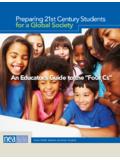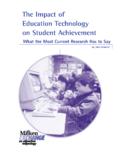Transcription of How Does Classroom Management Affect Student …
1 Student MOTIVATION 1. How does Classroom Management Affect Student learning and Motivation? Robert Chase December 16, 2012. University of New England EDU 690: Action Research Statement of Academic Honesty: I have read and understand the plagiarism policy as outlined in the Student Plagiarism and Academic Misconduct document relating to the Honesty/Cheating Policy. By attaching this statement to the title page of my paper, I certify that the work submitted is my original work developed specifically for this course and to the MSED. program. If it is found that cheating and/or plagiarism did take place in the writing of this paper, I acknowledge the possible consequences of the act/s, which could include expulsion from the University of New England.
2 Student MOTIVATION 2. Abstract Student motivation and the connection to Classroom Management , in a physical education Classroom , at Signal Hill Elementary School have been discussed previously by the Classroom educators. Often, the educators wondered what variables factored into discipline problems. The students in this study responded that various triggers Affect Classroom discipline and how Classroom discipline affects Student motivation. The triggers varied from lessons not being challenging enough, to the need to reiterate expectations and consequences on a frequent basis. Methodology such as formative evaluations, focus group interviews, and an attitude survey were used in the data collection process.
3 The findings revealed that parental approval was the primary reason for succeeding in school, by the students surveyed. Additionally, teacher approval also scored very high, by the same group of respondents. students were also surveyed about their interests and out of school activities. The purpose of this was to become more knowledgeable about the students and to create a stronger connection to them. It is concluded, that students who are intrinsically motivated are not affected by the triggers that result in other students disrupting instruction. Likewise, the development of challenging, yet not overwhelming lessons, also reduce the number of triggers that contribute to Classroom disruptions.
4 Key words: elementary school, discipline, motivation, triggers, attitude Student MOTIVATION 3. Table of Contents Table of Problem Rational for Research Ethical Administrative Parental A Review of Research Data Collection Data Student MOTIVATION 4. Limitations of Further Action 34. Student MOTIVATION 5. How does Classroom Management Affect Student learning and Motivation? Introduction Background Research conducted by Robert Chase, a kindergarten through fifth grade physical education teacher. The study was led by Mr. Chase during scheduled physical education classes and during remediation/enrichment time at the latter part of the school day.
5 The respondents were students in grades three through five at Signal Hill Elementary School. Signal Hill is part of the Prince William County Public School District in Manassas, VA. The elementary school enrollment of 650 students , includes an English for Speakers of Other Languages (ESOL) program, and multiple special education programs Autism (two classrooms), Severely Disabled (SD), and one Moderate Cognitive Impaired (MoCI) Classroom . Problem Statement Since Student motivation and Classroom discipline go hand-in-hand, teachers at every level must ensure that their learning environment is conducive to Student learning. The desire to have such a learning environment to promote Student motivation should be a natural goal for teachers regardless of the grade level/age of the students .
6 According to Anderman and Anderman, when teachers create environments that are not conducive to Student 's needs, motivational problems can be quite serious . (Anderman & Anderman, 2010, ). students who are actively engaged in the Classroom will likely not have the desire to misbehave and disrupt the environment. Additionally, students who believe that their teacher is truly interested in their likes and dislikes; their interests and hobbies;. generally are motivated to be more successful in school. When students are motivated, they will be less likely to engage in disruptive behaviors. During the elementary school is easier for teachers to redirect students back to the task at hand (Anderman & Anderman, 2010, p.)
7 174). Student MOTIVATION 6. Rationale for Study At the time of the study, Signal Hill had various behavior interventions in place, primarily the 1- 2-3 Magic Classroom program ( ) and the school's Think & Write and the Respect Violation interventions. The Think & Write was a process where a disruptive Student would have to write or, in the case of the lower elementary students , draw their behavior that resulted in them having to fill out the Think & Write form. They also needed to write/draw the expected behavior, so that they will not receive the Respect Violation. The Respect Violation is a form that is filled out by the teacher, stating the misbehavior by the students and the interventions used.
8 The form then is sent home where it was signed by the parent(s) and the Student , then returned to the teacher the next day. The Respect Violation form then stays in that students cumulative file. The desire to determine additional strategies to reduce the amount of triggers in the Classroom and to further motivate the students was the predominant reason for the study conducted by Mr. Chase. Participants The primary researcher has been teaching physical education for 19 years, all of which have been in the elementary (K-5) level. Mr. Chase has first-hand experience with working with general education as well as special education students , as well as having experience with the special education individualize education program (IEP) process.
9 Mr. Chase works closely with a team of educators to teach, promote and maintain school wide expectations. Student participation included 116 students in grades three through five. The focus group that was interviewed consisted of two fourth grade girls and one fourth grade boy; and one fifth grade girl and one fifth grade boy. Three white and two Hispanic students made up the group's demographics. students were chosen for the group based on teacher recommendations. Aside from the focus group interview, data was collected throughout the study during regularly scheduled physical education Student MOTIVATION 7. classes. Research Questions To direct the action research process, specific questions were comprised.
10 Firstly, what are the dominant factors of Student motivation and learning? Is parent/family approval a greater factor, in Student achievement, than teacher approval? Secondly, how does Classroom Management Affect Student achievement and Student learning? Finally, what are the specific triggers that can Affect Student behavior? Hypotheses It was hypothesized that students who are intrinsically motivated to succeed in class experience less Classroom discipline issues than those students who experienced no intrinsic or extrinsic motivation. It was further hypothesized that Student success in the Classroom is directly linked to Classroom Management as well as teachers who developed lessons with their students ' interests in mind, experience less Classroom discipline issues as a whole.







